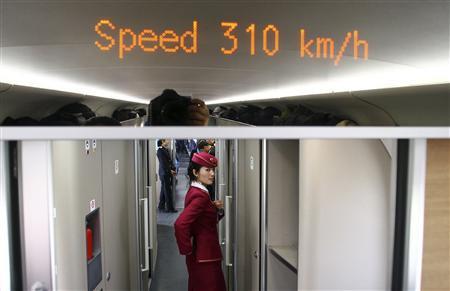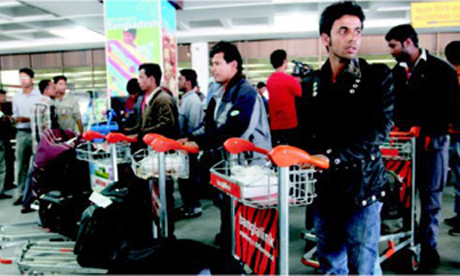 China will open the world’s longest high-speed rail line next week when a link between Beijing and the southern metropolis of Guangzhou is inaugurated, officials said on Saturday, underscoring its commitment to a trouble-plagued transport scheme.
China will open the world’s longest high-speed rail line next week when a link between Beijing and the southern metropolis of Guangzhou is inaugurated, officials said on Saturday, underscoring its commitment to a trouble-plagued transport scheme.
The 2,298-km (1,428-mile) line, parts of which are already in operation, will begin full service on Wednesday, halving travel time to less than 10 hours on trains which will run at 300 kph (186 mph).
The new route offers a chance for China’s railways ministry, which has been dogged by scandals and missteps, to redeem itself.
A July 2011 crash of a high-speed train killed 40 people and raised concerns about the safety of the fast-growing network and threatened plans to export high-speed technology.
“We have developed a full range of effective measures to manage safety,” Zhou Li, head of the ministry’s science and technology department, told reporters on a trial run from Beijing to the central city of Zhengzhou.
“We can control safety management,” he added.
Last year’s accident near the booming eastern coastal city of Wenzhou occurred when a high-speed train rammed into another stranded on the track after being hit by lightning.
Rail investment slowed sharply in the wake of that accident and state media reported earlier this year that the government had cut planned railway investment by 500 billion yuan ($80.27 billion) to 2.3 trillion yuan under a five-year plan to 2015.
But that may reflect cuts that have already taken place as the Ministry of Railways has raised its planned investment budget three times this year as part of government efforts to bolster a slowing economy.
The ministry plans to spend a total of 630 billion yuan in 2012 and has been given clearance to sell more bonds to finance the investments – one of the few outright spending commitments made by the central government in a slew of project approvals worth $157 billion which have not specified how they will be funded.
The approvals include 25 rail investments, state media say.
Despite its expanding network, the Ministry of Railways struggles to make money. It suffered an after-tax loss of 8.8 billion yuan in the first half of 2012 in the face of rising operating costs and mounting debts.
However, the government says it remained committed to building high-speed railways between its major cities, with China eventually planning to run them into Russia and down to Southeast Asia.
“High-speed railways are needed for national development, for the people and for regional communication. Many countries have boosted their economies by developing high-speed rail,” Zhou said.
China said in May it would open up the railway industry to private investment on an unprecedented scale, but private investors have been skeptical.
The need for funding is acute. China still needs billions more in rail investment to remove bottlenecks in cargo transport, ease overcrowding in passenger transport and develop commuter lines in its sprawling megacities.
Source : Reuters




































